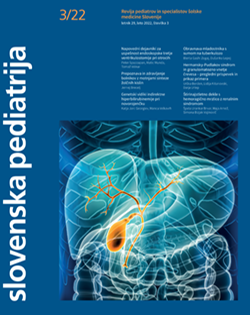
|
Article short contents
Slovenska pediatrija 2022; 29: 123-128
https://doi.org/10.38031/slovpediatr-2022-3-01en
|
: 382
Original scientific article
PROGNOSTIC FACTORS FOR THE SUCCESS OF ENDOSCOPIC THIRD VENTRICULOSTOMY IN CHILDREN
Peter Spazzapan
Enota otroške nevrokirurgije, Klinični oddelek za nevrokirurgijo, Kirurška klinika, Univerzitetni klinični center Ljubljana, Ljubljana, Slovenija
Matic Munda
Enota otroške nevrokirurgije, Klinični oddelek za nevrokirurgijo, Kirurška klinika, Univerzitetni klinični center Ljubljana, Ljubljana, Slovenija
Tomaž Velnar
Enota otroške nevrokirurgije, Klinični oddelek za nevrokirurgijo, Kirurška klinika, Univerzitetni klinični center Ljubljana, Ljubljana, Slovenija
Abstract
Introduction: Endoscopic third ventriculostomy (ETV) is a well-known and effective treatment for selected patients with hydrocephalus. Good patient selection is the basis for a good success rate of the procedure and the ETV scoring system (ETVSS) has been developed to predict the success rate in a selected patient. The ETVSS considers age, aetiology of hydrocephalus, and the presence of a previous cerebrospinal fluid shunt as independent factors in predicting the success of ETV. Age was defined as the strongest predictor since the success rate increased progressively with age.
Methods: The aim of our study was to retrospectively analyse all paediatric patients treated with ETV at our Institution between January 2016 and September 2021. We compared our data with previously reported studies, in particular with those that included the ETVSS in the analysis.
Results: Our results confirm age as the most important predictive factor for the success of ETV. In our series, the success rate was 33.3% for patients younger than 6 months and 94.4% for patients older than 6 months. The overall success rate in our series was 71%, which is similar to previously reported results. Conclusion: Good patient selection remains of paramount importance for the success of ETV. In our series, age was the single most important factor influencing the success of ETV.
Key words: endoscopic third ventriculostomy, intraventricular haemorrhage, cerebrospinal fluid, hydrocephalus, aqueductal stenosis